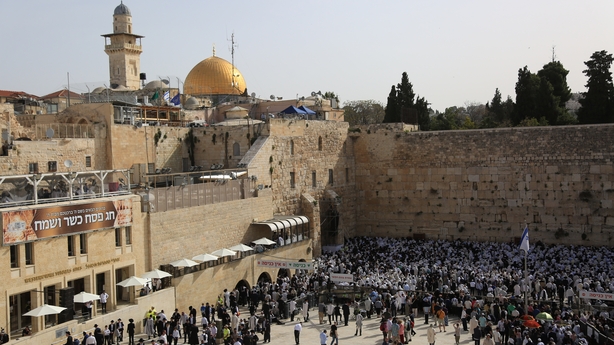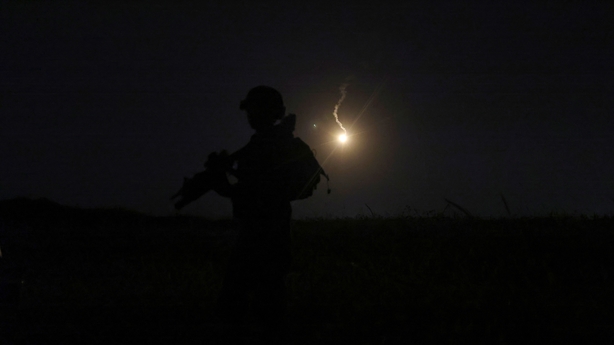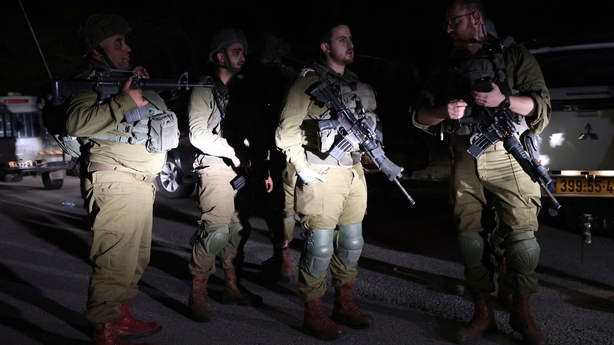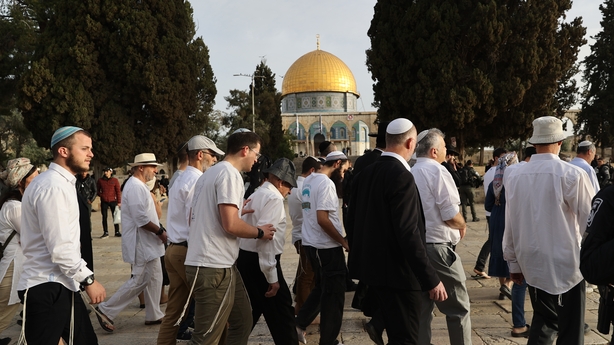The father of two British-Israeli sisters killed in a gun attack in the occupied West Bank has said he is "confident that justice will be done".
Rina and Maia Dee were shot dead in an attack on their car near an Israeli settlement in the West Bank on Friday.
The attack, by Palestinian assailants, came after Israel launched retaliatory air strikes at Lebanon and the Gaza Strip.
Tensions have been heightened by days of fighting at Jerusalem's most holy site during the rare convergence of Ramadan, Passover and Easter.
In a statement released by the girl's father, Rabbi Leo Dee, to the Telegraph, he said that the family was "saddened" by the "current political situation in Israel".
"Some people think that a religious government will suppress minority rights and become totalitarian," he said.
"But this is not a risk in Israel as religious Jews simply believe in balancing love and justice. For our part, we have felt a warm hug of love from Jews in Israel and beyond and we are confident that justice will be done."
The sisters were born in London, before the family moved to Israel in 2014. The family lived in the Efrat settlement, near the city of Bethlehem, according to the settlement's mayor Oded Revivi.
The sisters' 45-year-old mother was seriously wounded in the attack.
We need your consent to load this rte-player contentWe use rte-player to manage extra content that can set cookies on your device and collect data about your activity. Please review their details and accept them to load the content.Manage Preferences
Prayers take place in Jerusalem amid recent urge in violence
Meanwhile, thousands of worshippers held tense celebrations in Jerusalem today.
Pilgrims crowded into the narrow alleyways of Jerusalem's Old City, flanked by heavily armed Israeli security forces deployed following the recent deadly attacks.
Churchgoers were ushered through the courtyard of the Church of the Holy Sepulchre, built on the site where Christians believe Jesus was crucified, buried and resurrected.
Near the church, thousands of Jewish pilgrims gathered at the Western Wall for the traditional priestly blessing of Passover.

Pope Francis underlined his "deep concern" over a flare-up in tensions between Israel and Palestinians, as he led Easter Mass in St Peter's Square.
He said the renewed violence "threatens the desired climate of trust and mutual respect needed to resume dialogue between Israelis and Palestinians," as he addressed a crowd of tens of thousands.
The Israeli military said that in light of the security situation, it would extend a closure on the West Bank and Gaza until 13 April, when Passover ends.
It comes after Israel launched artillery strikes on Syria, following several rockets being fired from there and landed in the Israeli-occupied Golan Heights, the Israeli army said.
Israel's retaliatory strike to rocket attacks from Syria - which no one has claimed - is the latest episode in escalating violence in the region.
"In response to the rockets fired from Syria at Israel earlier today, IDF Artillery is currently striking in Syrian territory," the military tweeted.
A drone was also "currently striking the launchers in Syria from which rockets were launched into Israeli territory".
Six rockets were launched towards Israel last night, with two landing in the Golan Heights, the army said. At least one was intercepted by the Israeli air-defence system.
The 1,200sq/km region - patrolled by Israeli soldiers and bordering Lebanon - was seized from Syria in the 1967 Six-Day War. Israel later annexed it in a move that was never recognised by the international community.
Syrian state news agency SANA said the Israeli strikes took place around 5am (2am GMT).

Citing an unnamed military source, SANA said Syria's military had "intercepted the rockets... and brought down some of them".
The surge in violence and unrest comes as the Muslim fasting month of Ramadan, Jewish Passover, and Christian Easter coincide.
On Thursday, more than 30 rockets were fired from Lebanese soil into Israel, which the Israeli army blamed on Palestinian groups, saying it was most likely Hamas, which rules the Gaza Strip.
Israel then bombarded Gaza and southern Lebanon, targeting "terror infrastructures" that it said belonged to Hamas.
It was the biggest salvo fired from Lebanon since Israel fought a devastating 34-day war with Iran-backed militant group Hezbollah in 2006 and the first time Israel has confirmed an attack on Lebanese territory since April 2022.

Israel and Lebanon are technically in a state of war, and the ceasefire line is patrolled by the United Nations Interim Force in Lebanon (UNIFIL), deployed in the country's south.
On the Syrian side, Israel has recently intensified its raids targeting positions of pro-Iranian groups.
Prayers at Al-Aqsa Mosque
Dawn Ramadan prayers at the Al-Aqsa Mosque compound ended peacefully after days of heightened tension at the flashpoint Jerusalem site, as a mass Passover benediction at the adjacent Western Wall began.
Small groups of Jewish visitors under heavy police guard walked through the mosque compound, known in Judaism as Temple Mount, as thousands of worshippers gathered for the Passover's special "Priestly Blessing" at the Western Wall below.

The Al-Aqsa compound, which is sacred to Muslims and Jews, has been at the centre of a security crisis set off last week when Israeli police raided the mosque to dislodge what they said were youths barricaded inside armed with rocks and fireworks.
Footage of the raid, showing police beating worshippers, triggered a furious reaction across the Arab world, sparking rocket attacks on Israel by Palestinian factions that were met with Israeli strikes on sites in Gaza and southern Lebanon.
Overnight into this morning, at least six rockets were launched towards the Israeli-held Golan Heights from Syria, while Israeli jets struck Syrian military targets in response.
There were no reports of casualties on either side.
At Al-Aqsa, the special Tarawih Ramadan prayer last night also ended peacefully despite fears violence would erupt there once more.
Hours after the two British-Israeli sisters were killed on Friday, an Italian tourist was killed when a car driven by a man from an Arab city in Israel collided with a group in a shoreline park in Tel Aviv.
After a year of escalated Israeli-Palestinian violence, tensions are running especially high as Ramadan and Passover coincide, with a focus on the Al-Aqsa compound in Jerusalem's walled Old City.
Clashes there between police and worshippers helped spark a 10-day war Israel-Gaza war in 2021.
As in previous years, the government is expected to ban entry to the compound to non-Muslims for the last 10 days of Ramadan.,
Far-right Security Minister Itamar Ben-Gvir has called for the ban not to be imposed this year.
Since the beginning of January, the Israeli-Palestinian conflict has claimed the lives of at least 92 Palestinians, 18 Israelis, one Ukrainian and one Italian, according to an AFP count based on Israeli and Palestinian official sources.
These figures include, on the Palestinian side, combatants and civilians, including minors, and on the Israeli side, mostly civilians, including minors, and three members of the Arab minority.

